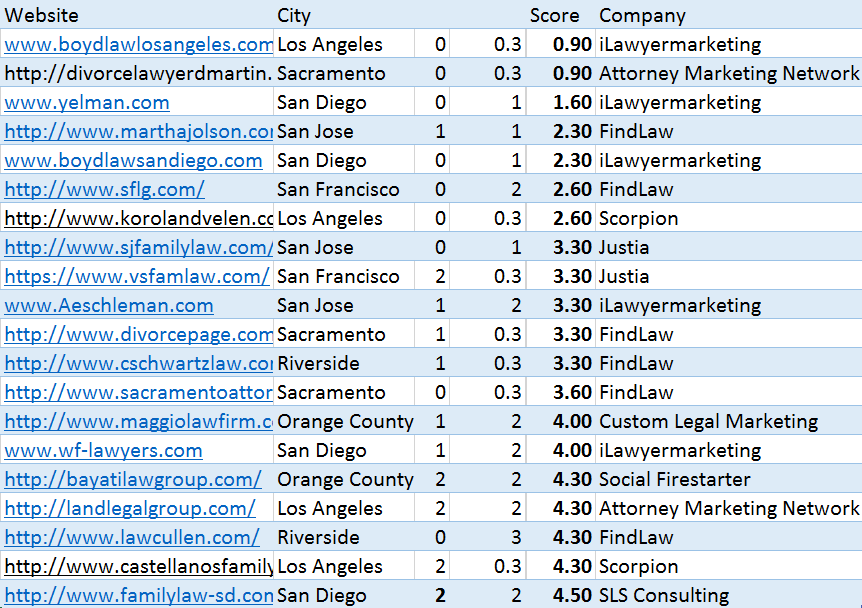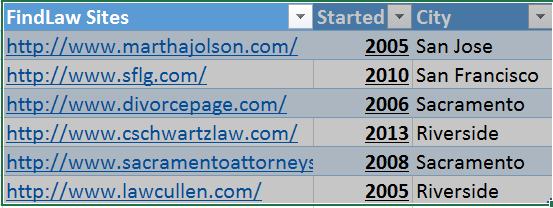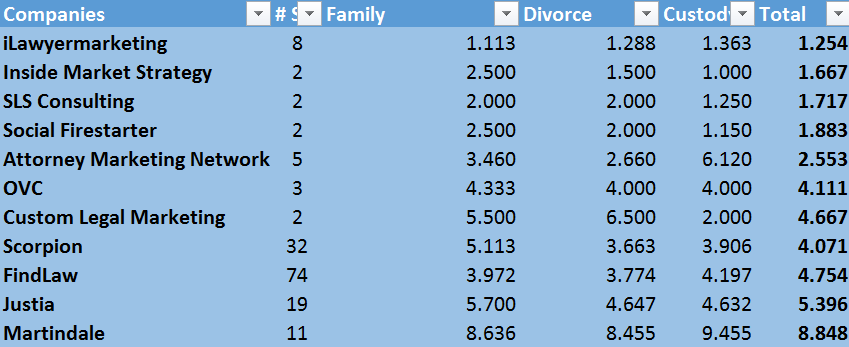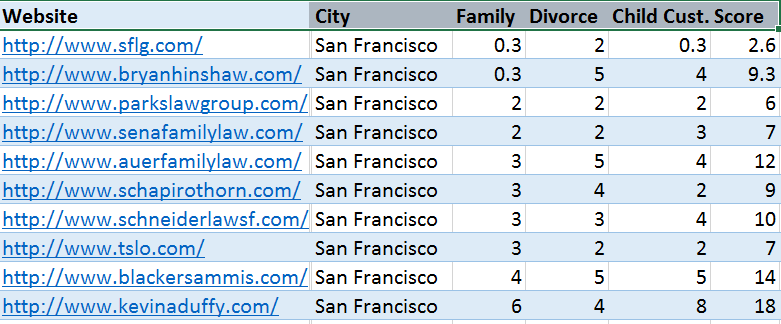
I often get frustrated when I hear an attorney say something like “every legal web company I talk to shows me great rankings” Indeed, most legal web marketing firms will often have some or even many high ranking clients to show to new prospects. What they are not showing, particularly the larger legal web companies, are the clients that are not doing well.
So with this in mind I wanted to set up a ranking study that looked at ranking consistency between legal website companies. I looked at family law in the 7 most competitive SEO markets in California; Los Angeles, San Diego, San Jose, San Francisco, Orange County, Sacramento and Riverside. In each market I ran three searches:
(City) + Family Lawyer
(City) + Divorce Lawyer
(City) + Child Custody Lawyer
For each search I manually recorded the ranking of every website. (Obviously I am only able to track firms that brand their site) I performed the analysis on Nov 28, 2016. To score a site’s ranking – I used the page position, as a raw score. So if a site came up on the 5th page they would score a 5, Page 3 scores a 3 and so on. To reward sites that that showed up in the maps OR in the first 3 organic positions, they would score a 0.3. Any site that did not show up in the top 10 pages received an 11. (At the end of this post I have included a detailed discussion about my methods). It took me 18 hours but I manually reviewed and recorded 2100 search results.
The Results
First lets look at the top performing Family law sites in California. The top site, BoydLawLosAngeles score of .90 reflects how the firm ranks in the top 3 for maps OR organic for each of the three keywords (Family Law, Divorce, and Child Custody) in Los Angeles. DivorcelawyerMartin accomplished the same feat in Sacramento. As you can see from the table below, a number of legal companies have some impressive rankings to show off. The problem is this only tells part of the story.

All the firms above have very good rankings, but are these results an accurate reflection of the SEO company? Sometimes a site’s good ranking has nothing to do with their SEO provider. Take for example Scorpions’s highest ranked site in Los Angeles www.korolandvelen.com. The reality is that this site has been ranking in LA with FindLaw since at least 2011 which is when I started tracking this. While the new Scorpion design is an improvement, the ancient site would likely be ranking anyway. A better way to judge an SEO company is to see how they handle brand new sites – a great idea for a future post.
Many attorneys, when doing their due diligence on a legal marketing SEO, will do what I did above. Simply do searches in major markets and see who is ranking on the top page for important keywords. An attorney looking at the list above might infer that FindLaw is a great choice for legal SEO, in that 6 FindLaw sites made the list. However, when you consider that Findlaw manages 74 optimized legal sites in the 7 cities, 6 great ranking sites does not seem as impressive. But why are those 6 FindLaw sites ranking when most are not? A big factor here is time. Most of their really high ranking websites have been with them a very long time so we are talking many years of optimization work.

This is true with almost all the big companies. If they have a high ranking site in a competitive metro, chances are it is a site that has been around for many years.
In the below chart I have the 11 legal SEO companies that had at least 2 family law clients in the top 7 California cities. After scoring each site based on where they ranked, I calculated an average rank consistency score (ARC) for each of the legal SEO companies. The lower the ARC the better.

As you can see from above, this tells a much different story. If an attorney was evaluating web companies and he or she only looked at the top performing sites in San Francisco and San Jose, they might decide on Justia given two of the top ranked family law sites are Justia sites. But when you consider all of the Justia sites in 7 cities – the picture is not as rosy. Justia has a ARC of 5.396, while its better than Martindale, its not great. It means they have a lot of sites that are buried deep in the search results. This is really not surprising given how tough SEO is these days. Big companies have to scale SEO across thousands of sites, making quality SEO very hard.
FindLaw is Big in San Francisco
FindLaw is unusually strong in San Francisco. Besides having the top ranked family law site, the ARC for their 10 family law sites that made the list is an impressive 3.163, almost two full points lower than FindLaw’s average in the State. This is also the case with personal injury.

What could cause this? I would argue that it is because of Gus Shuwayhat. Before he left earlier this year, Gus had been one of the most successful FindLaw consultants for the past 10+ years. As the top sales consultant in a large company like FindLaw, Gus had pull. He could leverage the best internal resources to help his clients and nobody did that better than Gus. But perhaps the biggest reason for FindLaw’s SF success was his ability to keep good competitors out. Gus has built up incredible relationships with his clients. Most are intensely loyal and would never consider leaving him, let alone take a call from a competitor. I know this first hand as iLawyermarketing.com, in its ten year history, has never had a website client in San Francisco. This has actually helped his clients, as top SEO companies that normally would occupy the top spots are not in San Francisco. Contrast that with Los Angeles, where there has been a tremendous amount of turnover in FindLaw sales reps. 5 years ago, FindLaw had huge content rich sites like Stolar-law and FeinbergWaller that were dominating the first page in Los Angeles for family law searches. Today those site are buried, in large part because of Internet marketing strategies that failed to look at long term SEO implications, as well as the influx of actual SEO companies that are outranking them.
Conclusion
While this analysis has its faults, I think it is helpful to show how ‘consistency of rank’ matters when it comes to evaluating legal SEO companies. If you hire an SEO company, that company should have a proven track record of performance. Being able to show a high ranking showcase account is great, but it should be the rule not the exception.
Problems with this Analysis
There are a number of issues with this type of ‘moment in time’ ranking analysis.
- There is no weighting for competition. Some markets are much more competitive then others. For example, to give the top ranked family site in Los Angeles the same score as the top ranked site in Sacramento or even San Francisco belies common sense. It would make better sense to do an analysis on metros that were similar in terms of SEO competition. This is what Condor Web Marketing did a few years ago. That said, I do think its useful to show which company was most consistent in getting ALL of their clients ranked.
- This type of analysis penalizes companies for releasing brand new sites as they are likely not ranking yet. Had I had more time, I would have used the Wayback machine to quantify how long a company has had the website client. By the way – if you find the Way back Machine as useful as I do – please give to their annual pledge drive, https://archive.org/web/ I do plan on updating this analysis next year in order to see how rankings have changed overtime.
- Not Every Client Does SEO! Yes this is true. That said, most of the sites featured from the 11 legal SEO companies did at least have optimized title tags of some sort, so it does seem like there was intent to rank. It would be an interesting survey – to ask each attorney if they had an expectation to rank when they were sold their site.
- Only sites that appeared on the first ten pages of one of the keyword searches – appear in this analysis. For example the Scorpion site fuscoandclarke.com is in Los Angeles but did not appear on the first ten pages in any of the searches I did – so it was excluded.
- After the 2nd page, I only included results that contained the City in the title tag or the URL. For example a Scorpion Site focused on Culver City showed up on the 7th page in a LA search. Since Los Angeles was not in the Title Tag and their office was not in LA , I excluded it as it would unfairly hurt Scorpion’s score.
- Sample Size. Obviously many of the firms that took the top spots, did so with just 2 sites. One of the reasons I looked at 7 metros was so I could capture as many of these smaller boutique SEO agencies as possible. While their low ACR could be seen as an outlier, the firms that did well, Social Firestarter, SLS Consulting, Inside Market are all serious SEO companies that know what they are doing. I monitor every legal competitor in the industry and while no SEO company is perfect, I would bet most of their clients would score well under this type of analysis.
- In one case I combined the good ranking between Mark Mitzner’s two Scorpion sites (family and custody site). Otherwise it would have unfairly hurt Scorpions rankings if we counted both sites.
- FindLaw’s practice of including 3 metro’s in many of their title tags hurts them in this ranking. For example Barbara Zipperman has a strongly ranked site in Sherman Oaks, but also goes after Los Angeles in her home page title tag, so her page 8 Los Angeles rankings hurt Findlaw’s ARC. However, this approach may also help smaller sites get traction in less competitive areas.
- There is no one true ranking when it comes to Google. Do to localization and personalization of search, different people will see different ranking results. Additionally, there are many different data centers used by Google. These data centers are constantly used to test different algorithms so they naturally return different results. So for example, running a search on Google which hits data center #1 could return one set of search results while running that same search and getting results back from datacenter #7 shows a different set of results.
- Conflict of Interest: *FULL DISCLOSURE: I am an employee of iLawyermarketing. Given that clear conflict of interest – any reader should be rightfully skeptical of the results. All I can say is I was absolutely meticulous in the way I recorded ranking results. While ranking results fluctuate, I am confident that anyone trying to recreate this test would see very similar results. If anyone wants the raw ranking data I will happily provide it.